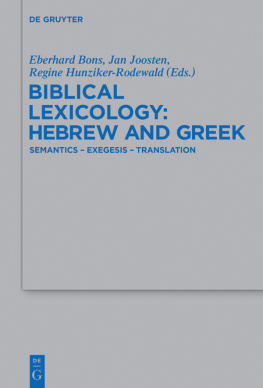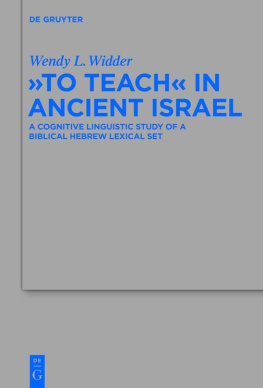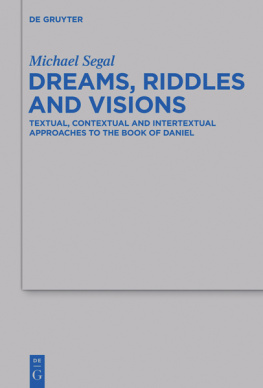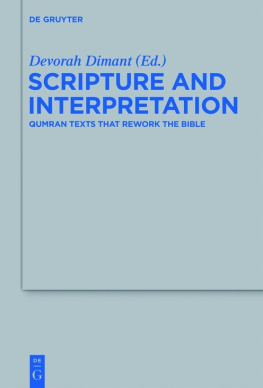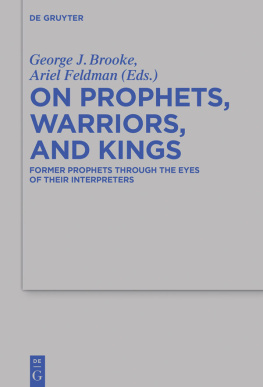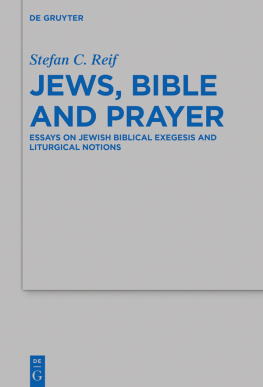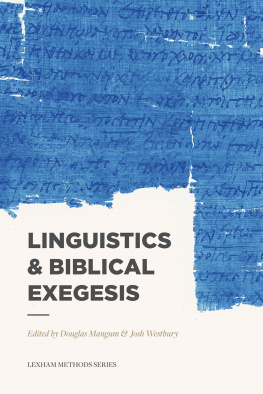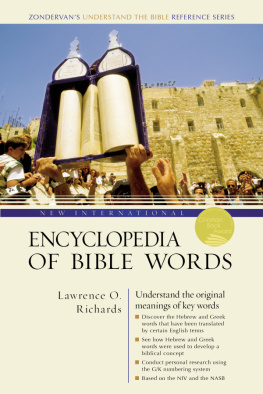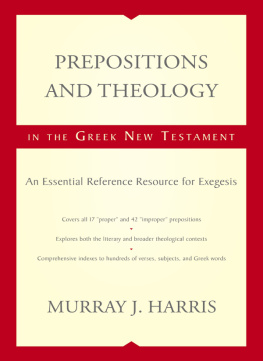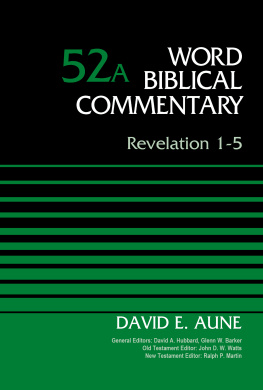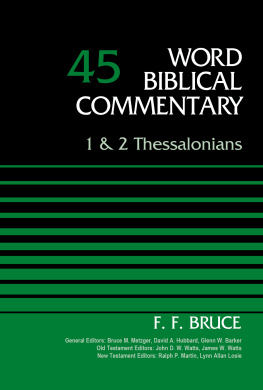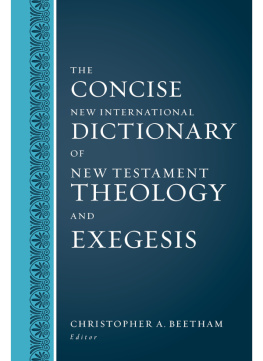Contents
Biblical Lexicology: Hebrew and Greek
Beihefte zur Zeitschrift
fr die alttestamentliche
Wissenschaft
Edited by
John Barton, Reinhard G. Kratz
and Markus Witte
Volume 443

ISBN 978-3-11-031206-5
e-ISBN (PDF) 978-3-11-031216-4
e-ISBN (EPUB) 978-3-11-038311-9
ISSN 0934-2575
Library of Congress Cataloging-in-Publication Data
A CIP catalog record for this book has been applied for at the Library of Congress.
Bibliographic information published by the Deutsche Nationalbibliothek
The Deutsche Nationalbibliothek lists this publication in the Deutsche Nationalbibliografie; detailed bibliographic data are available on the Internet at http://www.dnb.de .
2015 Walter de Gruyter Inc., Berlin/Boston
www.degruyter.com
Preface
The study of word meaning in ancient languages is fraught with difficulty. On dead languages, there are no native speakers one can interrogate. Only the texts can inform one about the words they contain. Etymology and the study of cognate languages may be of help; traditional interpretationancient translations or commentariesmay also be useful. At best, however, these additional sources of information will provide an approximation of word meaning. And at worst, they may lead one astray. In the final analysis only the context is a sure guide to what a given word means. But some contexts are too sparse or too enigmatic to do this effectively. And if the corpus attesting the ancient language is small, or made up of a collection of old and late texts, poetry and prose, and different local dialects, all this may increase the difficulty. In addition, the texts cannot always be taken at face value. In some cases, the texts may result from the combination of different literary strata thus giving words a context they werent originally intended for. In other cases, they may have suffered corruption in the course of scribal transmission, or they may have been updated linguistically by later editors.
In spite of all these obstacles, interpreters of ancient texts do not abandon the pursuit. The stakes are too high. Without a tolerably precise appreciation of word meaning, any understanding of old texts will remain out of reach. Complex and sophisticated procedures are devised, and refined over long periods of time, to determine the meaning of words in ancient languages.
Both the difficulty and the necessity of research on word meaning are excellently illustrated in the field of biblical studies. The biblical texts make up a rather limited corpus. They have come down to us in late manuscripts that show much variation. The writings stem from different periods and locations, and many of them are widely regarded as being composite. Determining what the words of the Bible mean is at times a near-impossible task. Many generations of scholars have spent their best efforts trying to achieve it nonetheless. In our own generation, many exciting developments are creating new possibilities, some of which merit to be briefly mentioned:
a)The discovery of Hebrew texts in the Dead Sea area, notably in Qumran, has had a profound and durable effect on biblical lexicology. Although the majority of texts were discovered more than sixty years ago, their decipherment, analysis and interpretation is still going on. The Dead Sea scrolls show how the vocabulary of the biblical texts was interpreted in the Hellenistic period, and how it continued to be actively used. The corpus also sheds light on the literary processes that produced the Hebrew Bible as we know it. Although many results of scrolls research have been integrated into biblical studies, many other observations still await critical reception.
b)The discovery of the Qumran texts has also reinvigorated historical study of the Hebrew language, and in various ways. The Dead Sea scrolls fill in an important gap in the attestation of literary Hebrew, between the last books of the biblical corpus and the earliest Tannaitic sources. They show that Hebrew continued to be practiced, at least in writing but almost certainly also in living speech. As a result, Hebraists nowadays are much more receptive to the idea that early and late phases of the language need to be studied together in mutual illumination. Similarly, Qumran Hebrew has transformed scientific approaches to the various traditions transmitting the biblical text. The Tiberian tradition is no longer considered the unique standard. The value of other traditionsmanuscripts with Babylonian pointing, the oral tradition of the Samaritans, Origens second columnis increasingly being recognized.
c)Biblical studies have in recent decades opened up to anthropological questions, and to the social sciences in general. These approaches have enriched historical critical exegesis of the classic type. The impact on lexicology is profound, as word meanings are related to socio-political and cultural representations.
d)Over the last thirty years or so, Septuagint studies have developed enormously. From being a useful tool in textual criticism, the Greek version has grown into an object of research in its own right. Study of the Septuagint, in comparison with the Hebrew Bible, leads to a binocular approach that lends additional perspective to the biblical text. Lexicology of the Septuagint is itself a burgeoning field with lots of unresolved questions. Nevertheless, it is already clear that Septuagint philology and philology of the Hebrew Bible are intimately related.
From 9 to 12 September 2012 a conference devoted to lexicological research and its relations to exegesis and translation was held in Strasbourg. The organizers were, and are, actively engaged in lexicological research: Regine Hunziker-Rode-wald was collaborating on Walter Dietrich and Samuel Arnets Konzise und aktualisierte Ausgabe des Hebrischen und Aramischen Lexikons, which has appeared in the meantime (Brill, 2013), Eberhard Bons and Jan Joosten are directing the Historical and Theological Lexicon of the Septuagint. Several other large-scale lexical projects were also represented, notably the recently completed Sheffield Hebrew Dictionary, the Semantics of Ancient Hebrew Database, and the Lexicon of Samaritan Hebrew. Other scholars addressed methodological issues or presented elaborate case studies illustrating at once the progress and the remaining challenges in this domain of research.
Our thanks go to the Catholic and Protestant Faculties of the University of Strasbourg and to their respective research groups, EA 4377 and 4378, as well as to the Scientific Council of the same university. The lions share of the budget of the conference was provided by the Institut Universitaire de France. Our research assistant, Phoebe Woods, was instrumental in organizing the conference. The publication of the papers was prepared by Romina Vergari. Last but not least, we thank all the participants in the conference for their contributions.
Eberhard Bons
Jan Joosten
Regine Hunziker-Rodewald
Part I: Hebrew
Mark S. Smith
Words and Their Worlds
For Jonas, again (and again)
I.Introduction
In this essay, I offer my reflections on the study of words. My primary research does not lie in lexicography, but in textual commentary, literature and religion. Of course, words and their study are indispensable and foundational for all of these areas.
To locate my own experience and sensibility about words, I would say that my work in this area finds its greatest resonance with the encyclopedic knowledge and proven intuitions of my teacher, Jonas C. Greenfield.
There is a theoretical reason involved in my emphasis on the applied or practical. The use of modern linguistics concepts (such as word fields) by modern students of biblical (or ancient Hebrew) lexicography has been vitally important for the study of words, but at times it does not account for what we might call the ancient thinking about language or words. This is not to deny the tremendous value of the use of modern theory; it is only to ask that ancient understandings be included in our modern search for the meaning of ancient words. While it might be thought that the first task of lexicography is to capture the intuitions of ancient users about words and language, I find a good deal work in semantics of ancient Hebrew disengaged from its users and their specific linguistic and cultural contexts. Lexicography includes the ancients operating assumptions. How did they think about words? West Semites did not write ancient treatises or modern dissertations, books or articles on the subject. Instead, what they thought about words is embedded in what they did with words. So that is where I begin.

